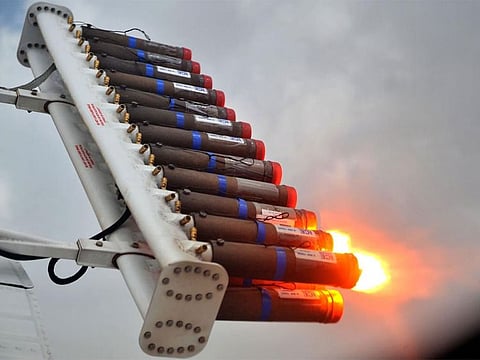Work starts on ‘revolutionary’ new UAE cloud seeding project
Experts seek real-time prospects of seedablity of clouds for rain enhancement

Abu Dhabi: UAE seeks to develop the capability to analyse seedability of clouds in real-time during cloud seeding flights for rain enhancement. The move will revolutionise the way cloud seeding is performed and evaluated, with the aim of increasing rain from clouds.
This was revealed as the UAE Research Programme for Rain Enhancement Science (UAEREP) recently attended a project kick-off meeting with Professor Daniel Rosenfeld of the Hebrew University of Jerusalem and his team, who are the award recipients of the 5th UAEREP grant cycle. The meeting was held in Abu Dhabi at the Mohamed bin Zayed University of Artificial Intelligence (MBZUAI), one of the collaborating research institutions on the project.
The team discussed the project’s research methodology, objective and timeline, as well as the National Centre of Meteorology (NCM)-UAEREP evaluation and oversight mechanism, and technical support needed from NCM throughout the project duration.
The project, led by Prof Rosenfeld and titled ‘Identification of Clouds’ Microphysical Seedability in an Actionable Manner’, seeks to develop the capability to diagnose cloud seedability in near real-time at a spatial resolution of the convective cloud cluster, based on operationally available satellite and meteorological data. Building on previous UAEREP research, this project aims to allow for concurrent assessment and guidance during cloud seeding flights. These methods are highly complementary with previous UAEREP project initiatives.
The meeting also provided specific details for NCM regarding the research team’s various requirements, as the project will utilise machine learning procedures. Those at the meeting also took a tour of the MBZUAI campus and laboratory facilities, providing context for necessary technology employed within the project.
Water security challenges
Alya Al Mazroui, director of UAEREP, said: “At UAEREP, our international partnerships are spurred by our commitment to responsible innovation and an emphasis on global prosperity. With the goal of unity in science, this initiative underscores UAEREP’s commitment to advancing cutting-edge research in rain enhancement science, furthering our mission to address global water security challenges. We look forward to supporting Professor Rosenfeld and his team as they seek innovative solutions to diagnosing cloud seedability.”
Prof Rosenfeld, a leading expert on weather modification and climate change at the Institute of Earth Sciences, Hebrew University of Jerusalem, and 5th cycle UAEREP awardee, said: “As we embark on this collaborative journey with UAEREP, our team is honoured to contribute as 5th cycle awardees and give rise to the advancement of rain enhancement science. Through our project, we aim to develop actionable methods for identifying cloud seedability for real-time analysis, revolutionising the way cloud seeding is performed and evaluated.”
Dr Salman Khan, Associate Professor of Computer Vision at MBZUAI, said: “The team here at MBZUAI is honoured to be part of this project with Prof. Rosenfeld and UAEREP, especially as we find new ways to integrate advanced machine learning technology with specialised weather modification techniques. This collaboration will serve to advance the methods by which we integrate artificial intelligence with climate change solutions.”
The team, led by Prof Rosenfeld, additionally includes researchers from institutions such as MBZUAI, the School of Remote Sensing and Information Engineering at Wuhan University, the Scripps Institution for Oceanography at the University of California San Diego, and WeatherItIs. As part of its overarching mission, UAEREP believes this project will further foster capacity building initiatives within the research community, ensuring sustained progress and knowledge exchange in the field of rain enhancement science.
Sign up for the Daily Briefing
Get the latest news and updates straight to your inbox



